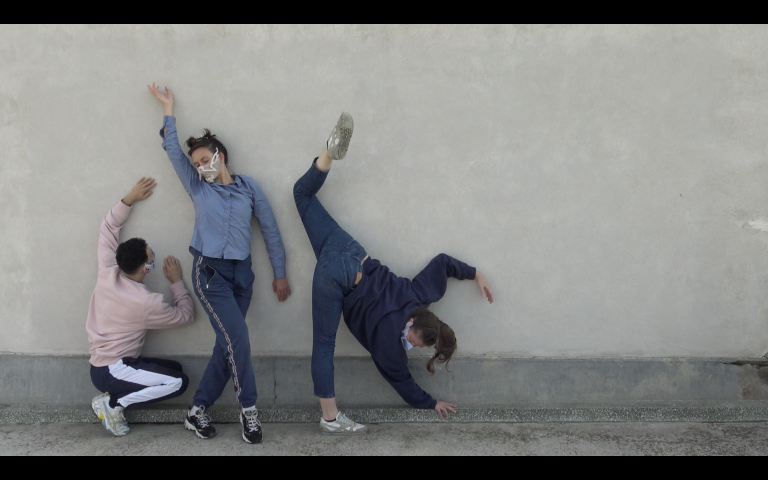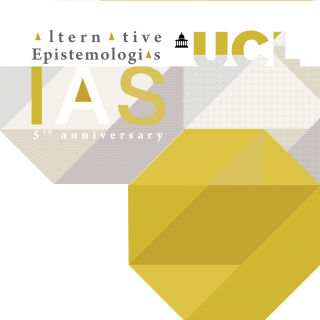VIRTUAL IAS Festival: Floral Collectivism: Postsocialist Eco-Epistemologies
06 May 2021, 2:30 pm–4:00 pm

A panel discussion with artist Alexandra Pirici and members of Woods - Community for Cultivation, Theory and Art, Edith Jeřábková and Tereza Porybná, with responses by Ashley Dawson (Professor of Postcolonial Studies CUNY Graduate Center) and Khadija von Zinnenburg Carroll (Professor of Global Art University of Birmingham). Moderated and introduced by Maja and Reuben Fowkes (Postsocialist Art Centre UCL).
This event is free.
Event Information
Open to
- All
Availability
- Yes
Cost
- Free
Organiser
-
Institute of Advanced Studies
This panel draws on artistic and curatorial investigations into the multiplicity of vegetal life to explore the potential of embodied and sensuous approaches to knowledge in providing an alternative to the dominant epistemologies of Western modernity. It includes discussion of artist Alexandra Pirici’s choreographic translations for human bodies of the movement and dynamics of plants that expand the anthropocentric understanding of sociality, cognition and intelligence. A presentation of Woods – Community for Cultivation Theory and Art will address the question of why artists and academics are turning to the countryside to develop alternative modes of research and learning that are embedded in a praxis of co-creating knowledge in solidarity with other species in the natural environment. Also at issue is the extent to which Soviet agronomist Trofim Lysenko’s quirky botanical theory of ‘floral collectivism’, which entailed planting trees closer together in circular formations rather in geometrical rows in order to encourage proletarian solidarity, chime with current interests in plant-plant relations and solidarities that pass between non-human species. Postsocialist eco-epistemologies will also be addressed by investigating the affinities between decolonial theorist Boaventura de Sousa Santos call for a ‘epistemological break’ from the edifice of modern Western philosophy based on the dualistic divide between nature and culture and attempts to rethink human-plant relations in non-instrumentalizing and nurturing ways.
SPEAKERS
Alexandra Pirici is an artist with a background in dance and choreography who works undisciplined, across different mediums. Her work has been exhibited within the decennial art exhibition Skulptur Projekte Münster 2017, the Venice Biennale - Romanian Pavilion at the 55th edition, Tate Modern London, New Museum New York, Art Basel Messeplatz, The 9th Berlin Biennale, Manifesta 10, Centre Pompidou - Paris, Museum Ludwig Cologne, the Van Abbemuseum Eindhoven, Russian Museum St. Petersburg, Neuer Berliner Kunstverein, HAU Theatre Berlin, Museum of Modern Art Warsaw, Chicago Architectural Biennial among many others. She works in museum contexts, theatrical frameworks and the public space. She choreographs ongoing actions, performative monuments and performative environments that fuse dance, sculpture, spoken word and music. Her works deal with monumentality or the history of specific places and institutions in order to playfully tackle and transform existing hierarchies. They also reflect on the history and function of gestures in art and popular culture or on questions about the body, its presence, absence or image and the politics of capture. Her performative artworks are part of private and public collections as live actions.
WOODS – Community for Cultivation, Theory and Art is a space linking creation, research, agricultural work, activism and rest. The 2.8-hectare plot of forest and meadow in Orlické Mountains, in the Czech Republic, was purchased with a vision to create a sustainable biodiverse forest amenable to a wide variety of life forms from microorganisms, bacteria, plants, mushrooms, and animals all the way to humans. A farm is gradually being created on the plot, as is a garden founded on permaculture principles and a year-long programme of educational and cultural activities, including annual summer symposiums. The project is actively responding to climate change, the accelerating processes associated with it, and the need to maintain a healthy relationship between the land and those who use it, human and non-human. We would like to gradually change the ways in which the countryside is used for agriculture, forestry and leisure activities, moving towards a more interconnected relationship between the land and the people in it. By sharing and collaborating with local and artistic communities, we aim to protect diversity of flora and fauna on the planet, in the soil and in the gut. We aim to accomplish this through active care for the land, academic studies, and joint actions of all types and orientations, both for the community and for the public. Speakers: Edith Jeřábková, curator Plato Gallery, Ostrava and art writer, founder of WOODS and Tereza Porybná, creative producer, founding member of WOODS.
Maja and Reuben Fowkes are art historians, curators and co-directors of the Postsocialist Art Centre (PACT) at University College London and founders of Translocal Institute for Contemporary Art. Their publications include Art and Climate Change (Thames & Hudson, forthcoming 2022), the edited volume Ilona Németh: Eastern Sugar (Sternberg Press, 2021), Central and Eastern European Art Since 1950 (Thames & Hudson, 2020), a special issue of Third Text on ‘Actually Existing Worlds of Socialism’ (2018) and Maja Fowkes’s The Green Bloc: Neo-Avant-Garde and Ecology under Socialism (2015). They are curators of the exhibition ‘Will there be Sugar after the Rebellion? Potential Agrarianisms’ at Kunsthalle Bratislava (August 2021). They lead the collective research programme Confrontations: Sessions in East European Art History. www.translocal.org
Ashley Dawson is Professor of Postcolonial Studies in the English Department at the Graduate Center / City University of New York and the College of Staten Island. His latest books include People’s Power: Reclaiming the Energy Commons (O/R, 2020), Extreme Cities: The Peril and Promise of Urban Life in the Age of Climate Change (Verso, 2017), and Extinction: A Radical History (O/R, 2016). A member of the Social Text Collective and the founder of the CUNY Climate Action Lab, he is a long-time climate justice activist. He is currently at work on a book entitled Environmentalism from Below and, with the Environmental Humanities Lab in Stockholm, on the creation of a global network of organizations devoted to radical people’s planning for climate action.
Prof. Khadija von Zinnenburg Carroll is an Austrian-Australian artist and historian based between Vienna and London. She is Professor and Chair of Global Art at the University of Birmingham and is currently leading an ERC project (2021-2026) on repatriation entitled REPATRIATES: Artistic Research in Museums and Communities in the process of Repatriation from Europe. She is the author of the books Art in the Time of Colony (2014); The Importance of Being Anachronistic: Contemporary Aboriginal Art and Museum Reparations (2016), Bordered Lives: Immigration Detention Archive (2020); Mit Fremden Federn: El Penacho und die Frage der Restitution (2021); The Contested Crown: Repatriation Politics between Mexico and Europe (2021) and Botanical Drift: Protagonists of the Invasive Herbarium (2017), an artist's history based on a series of interventions into the Economic Botany collection at Kew Gardens. Other texts that have focussed on the relationships between plants and power, botany and history, that have recently been published by Khadija appear in Theatrum Botanicum for Manifesta 12, and the Third Text journal, of which she is also an editor. www.kdja.org
This talk forms part of the IAS five-year anniversary festival on the theme of ‘Alternative Epistemologies’.
All welcome. Please do not hesitate to contact us if you need assistance on the day, and follow this FAQ link for more information and to read our virtual events code of conduct. All of our events are free, but you can support the IAS here.
 Close
Close

